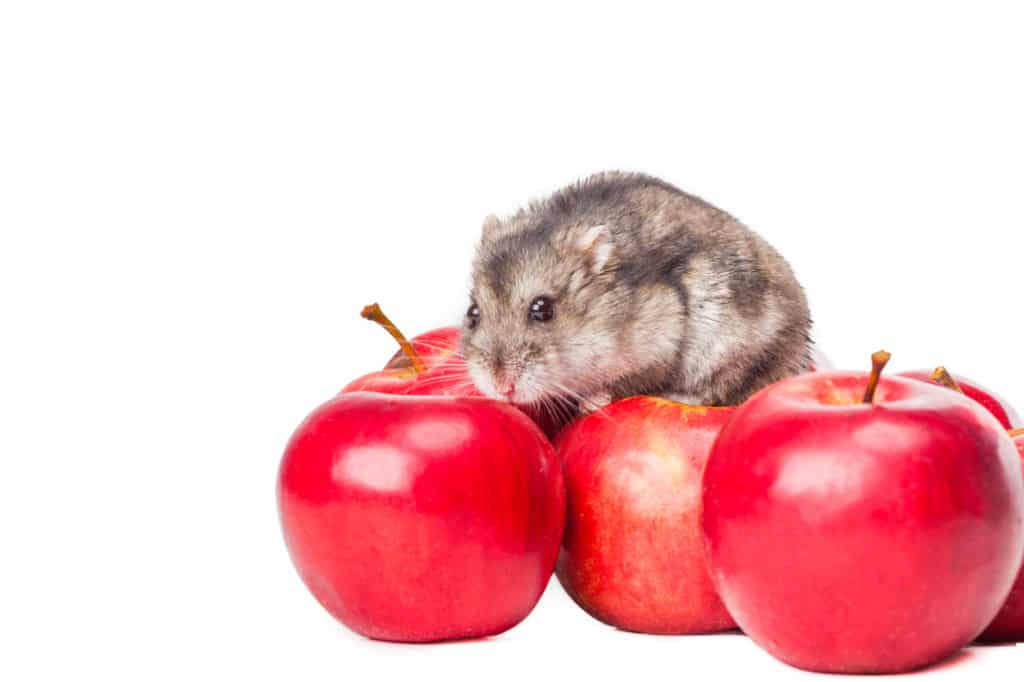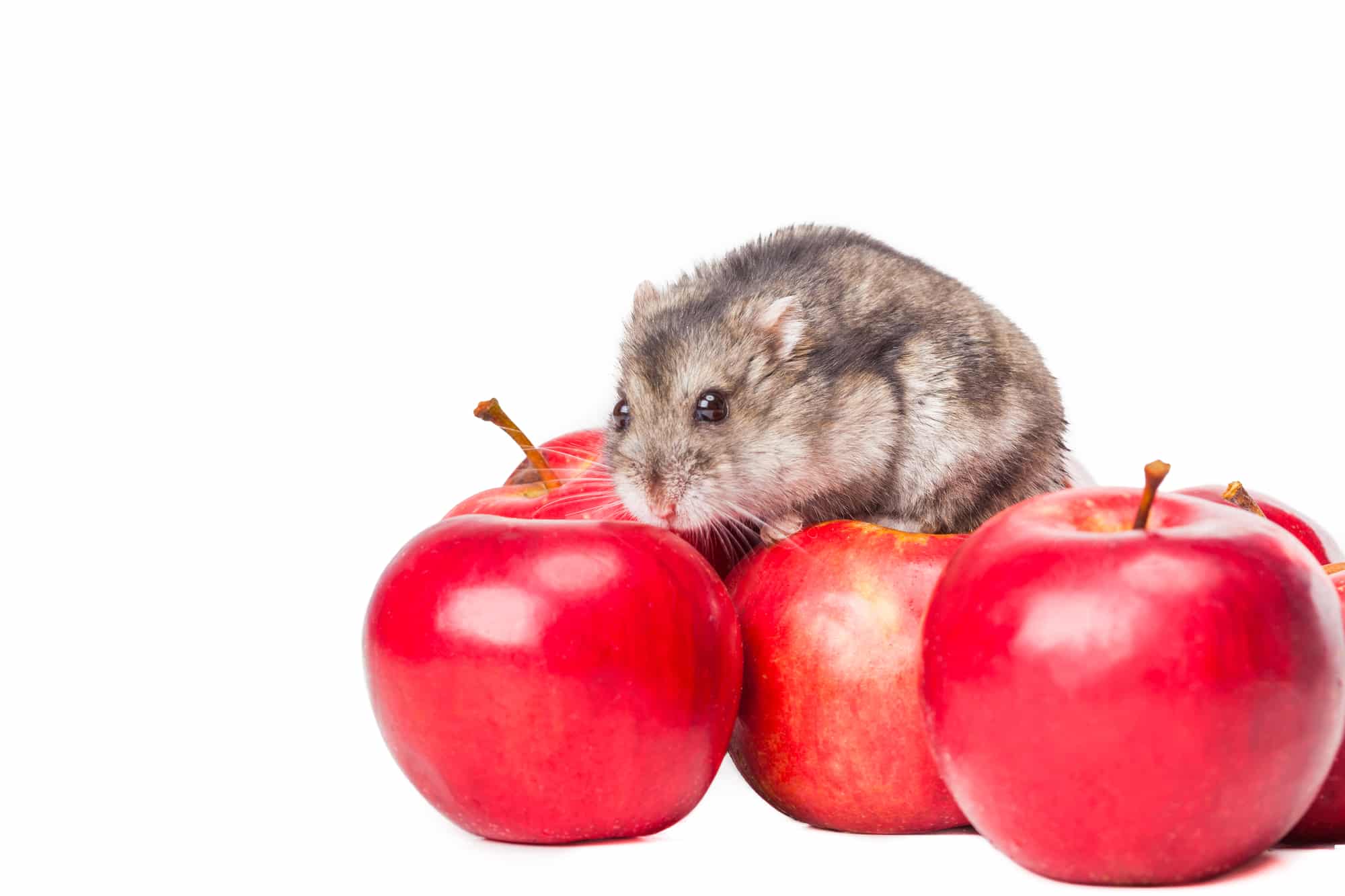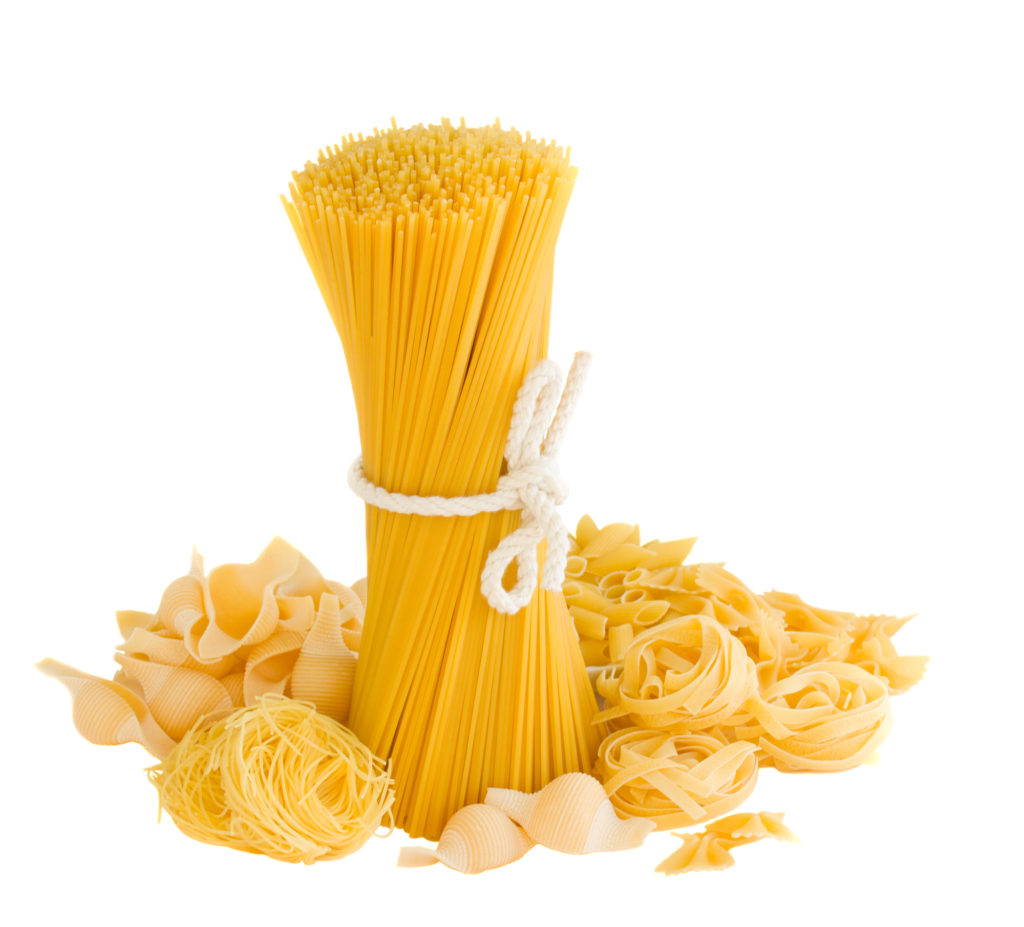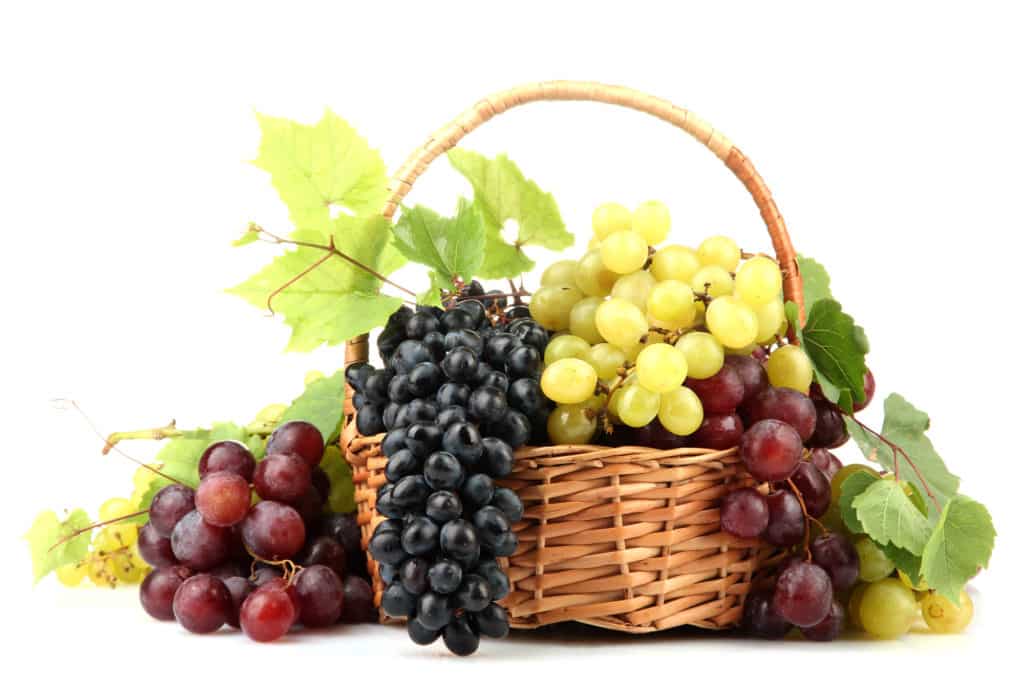“An apple a day keeps the doctor away.” I am sure we have all heard of that proverb. We know that holds true for humans. But what about hamsters? Can hamsters eat apples? If they can eat apples, how much can they eat? What are the health benefits and risks of feeding apples to your hamsters? Read on to find out.
Apples – Nutrition data
In this section, let’s take a look at the amount of nutrients 100g of apples contain.
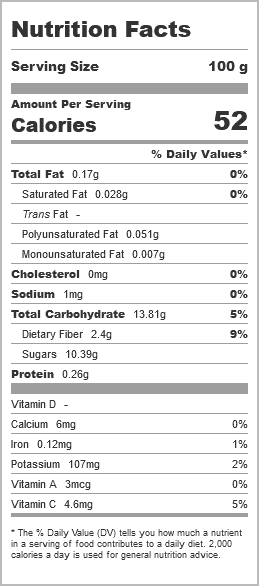
(Source: Fat Secret)
Can you give apples to your hamster?
I know you are eager to find out if you can give apples to your hamster. But before we venture any further into this topic, let’s find out the health benefits and risks of feeding apples to your hamster.
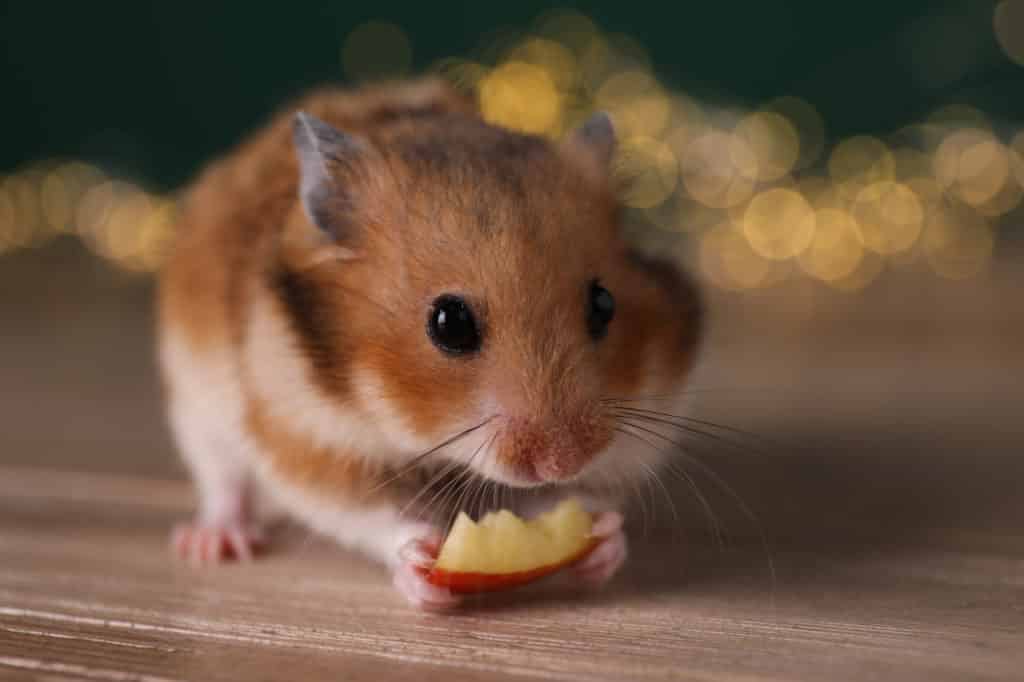
Health benefits of eating apples
1. Apple contains fiber and a lot of water. Moreover, apples reduce the rate at which the stomach empties food content giving a sense of satiety for a longer time (Source: PubMed). So, it makes your hamster feel full sooner and prevents him from overeating, thus effectively fighting obesity and aiding weight loss. Moreover, the soluble fiber present in apples prevents cholesterol from building up in the walls of blood vessels, thereby reducing the risk of atherosclerosis (diminished blood flow in the arteries) and other heart diseases (Source: Everyday Health).
2. Apples have both types of dietary fiber – Soluble and Insoluble. Soluble fiber can slow down the digestion of glucose, thus keeping blood sugar levels in check. Insoluble fiber attracts water to the stool, making it smoother and easier to move through the bowel, thus reducing the risk of constipation. The skin of the apple contains most of the insoluble fiber.
3. BMI (Body Mass Index) is a risk factor for heart disease, i.e., the higher the BMI of a person, the greater his/her risk for heart disease. Apple helps reduce BMI, thus protecting people from heart diseases. Based on observational studies, apple intake could decrease the risk of cardiovascular death, cerebrovascular disease, type 2 diabetes, and all-cause mortality (Source: PubMed). This might also hold true for our furry friends. Moreover, potassium, the main mineral that apples contain, helps regulate heartbeat, besides regulating the amount of fluids in the body, helping muscles contract and conducting nerve impulses (Source: Healthline).
4. Free radicals are dangerous molecules produced in the body during cellular respiration, the process through which cells produce energy from food molecules. If left unchecked, free radicals can damage the cells, their membranes, and the DNA in the body, causing chronic diseases like cancer. Antioxidants are molecules that neutralize the free radicals before they can damage the body. According to a study, the antioxidants present in apples may be effective against several types of cancers, including breast, lung, and digestive tract cancers (Source: PubMed). Moreover, pectin, a type of fiber present in apples, may inhibit the growth of cancer cells and lead to their death.
5. Apple contains Vitamin C, which boosts the immune system. Moreover, quercetin, an antioxidant present in the skin of apples, can reduce inflammation and regulate the immune system. Moreover, the soluble fiber in apples makes the immune cells act in an anti-inflammatory manner, helping the body recover faster after an infection (Source: Eat This, Not That).
6. The fiber and polyphenols (a type of antioxidant) present in apples can support gut microbiota, the microorganisms found in the large intestine that aid the digestive and the immune systems and improve brain health. Thus, apples can improve gut health.
7. Quertecin, an antioxidant present in apples, can also protect the brain and nerves from oxidative damage, thereby reducing the risk of dementia and Alzheimer’s disease (Source: Healthline).
Risks
Apples may be highly beneficial for the health of your hamster. But when fed in excess, they can be dangerous for your hamster. In particular, they can cause the following health problems.
1. Apples constantly appear in the Dirty Dozen, a list created by the Environmental Working Group ranking food items in the decreasing order of the amount of pesticide residue they contain (Source: EWG). So, if your hamster eats apples (which are not organic) too often, these toxic chemicals can accumulate and become detrimental to his health.
2. Apples contain reasonable amounts of dietary fiber. So, eating too many apples can cause digestive issues like bloating and diarrhea.
3. Since apple is a sugary fruit, eating too many apples can also increase blood sugar levels. It can also increase the craving for sugar. So, your hamster might become diabetic.
4. To lose weight, the body must burn fat. But consuming too many apples can make that difficult because apples provide carbohydrates to the body. So, the body will end up burning carbohydrates instead of fat, thus affecting weight loss goals. As a result, your hamster might become obese.
5. Since apple is acidic, it might damage the teeth when consumed in excess (Source: Eat This, Not That).
6. Apple seeds contain a very small amount of cyanide (Source: Organic Health Fact). Even though this is not dangerous for humans, it can be deadly for hamsters. So, you should never give your hamster apple seeds.
Different types of hamsters vs. apple
Apple can be a healthy food for hamsters when fed in moderation. But the amount of apple a hamster can eat differs from one species to another. After all, there are 5 different species of pet hamsters. So, in this section, let’s find out if each of these species can eat apples and, if they can, how much is safe for them.
Can Chinese dwarf hamsters eat apples?
Chinese dwarf hamsters are small hamsters. So, their digestive systems cannot handle as much sugars and acid content as bigger hamsters. Moreover, they are prone to diabetes as well. Since apples are both high in sugar as well as contain acid content, some pet owners advise not giving apples to Chinese hamsters (Source: Just Hamsters). However, there are pet owners who find it OK to give apples to dwarf hamsters, albeit only seldom and in very small quantities (Source: Petvills).
So, you can give a very small piece of apple to your Chinese dwarf hamster and observe his behavior for the next 24 hours. If you don’t observe anything out of the ordinary, you can continue giving a small piece of an apple once a week or fortnight.
Can Campbell dwarf hamsters eat apples?
Just like Chinese dwarf hamsters, Campbell hamsters are also dwarf hamsters. So, as in the case of Chinese dwarf hamsters, start with a very small piece of apple. If you don’t notice any changes in the behavior of your hamster, you can continue giving him a small piece once a week or fortnight.
Can Russian dwarf hamsters eat apples?
Russian dwarf hamsters, also known as Winter White hamsters, are also dwarf hamsters. Their small size means that their digestive systems are not capable of coping with the high sugar content and acid content in apples. So, just as in the case of other dwarf hamsters, you can give only a very small piece of an apple once a week or fortnight.
Can Roborovski hamsters eat apples?
Roborovski hamsters are also dwarf hamsters. Indeed, they are the smallest species of hamsters. So, you can only give a very small piece of an apple to your Roborovski hamster once a week or fortnight.
Can Syrian hamsters eat apples?
Syrian hamsters are the largest pet hamster species. Their digestive systems can tolerate more sugar and acid content than dwarf hamsters. So, you can give apples to your Syrian hamster. But you should keep the amount and the feeding frequency to a minimum. Pet owners advise giving Syrian hamsters a quarter of a teaspoon of apple twice a week.
FAQ
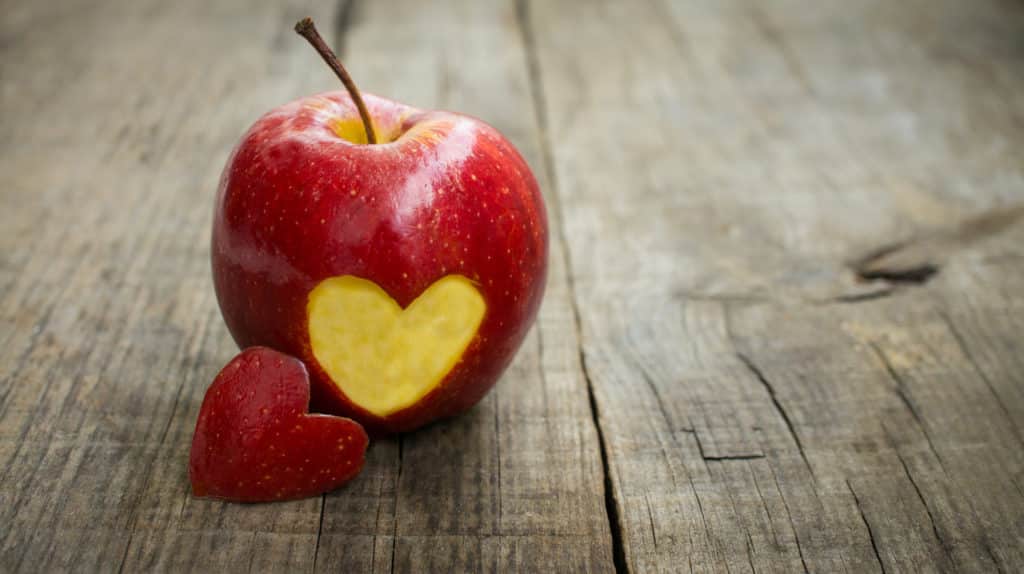
Can hamsters eat the skin or peel of an apple?
Apple peel is actually quite nutritious since it contains fiber, vitamins, and antioxidants like quercetin, which reduces inflammation and regulates the immune system. So, your hamster can eat apple skin. So, you don’t have to peel the apple before giving it to your hamster.
Can I feed my hamster apple every day?
Apples have a lot of sugar and acidic content. So, they can upset your hamster’s digestive system and cause obesity and diabetes if fed often. Therefore, you shouldn’t feed apples to your hamster every day.
Can hamsters eat apple seeds?
Apple seeds contain very little amount of a toxic chemical called cyanide. The amount of cyanide an apple seed contains is very less. So, you won’t die if you eat one or two apple seeds. But the same is not true for your hamster. For a tiny animal like a hamster, even one or two apple seeds can be deadly. Moreover, apple seeds also pose a choking hazard. So, you should never give apple seeds to your hamster.
Can hamsters eat green apples?
Green apples can be sour and acidic. So, as a general rule of thumb, you should avoid green apples. But if the green apple isn’t sour, you can give a piece of it to your hamster (Source: Hamster Central).
How to feed an apple to your hamster?
When you rank fruits in terms of the pesticide residues they contain, apples rank near the top. These chemicals can be dangerous for your hamster. So, buy organic apples for your hamster.
Before giving an apple to your hamster, wash it in running cold water for a few seconds.
Then, cut the apple into small pieces and give a very small piece without seeds (but that piece can contain apple skin) to your hamster.
Hamsters have the habit of hoarding food and then taking it to their hiding place and storing it there for future use. But apples can go bad quickly once cut. So, check your hamster’s cage every 24 hours to make sure that your hamster hasn’t stored any pieces of uneaten fruits and vegetables. If you find any such hidden food items, remove them immediately.
If you notice any changes in behavior after giving apples to your hamster, consult a vet immediately.
Fun Facts
Apple
As you would already know, the fruit produced by the apple tree (Malus Domestica) is called apple. Apple trees grown from seeds tend to be very different from their parents, lacking the characteristics that farmers need. So, grafting is used instead to grow apple trees (Source: Wikipedia).
There are more than 7,500 varieties of apples in the world. Almost 2,500 of them are grown in the USA. But the biggest producer of apples is China, producing nearly half of the global supply of apples (as of 2018).
Origin
Apple is thought to have originated from Malus Sieversii, a wild apple species found in the mountains of Kazakhstan. Our early paleolithic ancestors who lived in Kazakhstan 750,000 years ago might have discovered and eaten these sour wild fruits (Source: North Carolina Historic Sites).
The transition of apples from a wild fruit to a domestically grown fruit happened 4,000 to 10,000 years ago in the Tian Shan mountains that stretch through Kazakhstan, Kyrgyzstan, China, and Uzbekistan. From the Tian Shan mountain ranges, apples and their seeds traveled through the silk road.
Around 1,500 BC, the Romans, Greeks, and Etruscans had all started cultivating apples. By 800 BC, the Greeks learned the grafting method for growing apples. By 200 BC, the Romans started planting apple orchards in Britain. And more than a millennium later, the Europeans brought apples to Mexico and South America.
Summary
Hamsters are little animals that are always active. Even though the commercially available hamster pellets are enough to take care of the nutritional demands of a hamster’s body, fresh foods can also make a great addition to a hamster’s diet in terms of both variety and nutrition. This will help you create a balanced diet for your hamster.
So, you can add fresh fruit like an apple to your hamster’s diet now and then. After all, apples are highly nutritious. The following health benefits of apples are hard to ignore.
1. Apples help in fighting obesity and type 2 diabetes.
2. Apples keep sugar levels in check and aid smooth movement of stools, thus avoiding constipation.
3. They are good for cardiovascular and cerebrovascular health.
4. They help prevent certain types of cancers.
5. They strengthen the immune system.
6. They improve gut health.
Yet, despite all their health benefits, apples also contain a lot of sugar and a little bit of acid. The amount of acid they contain may not be as high as in citrus fruits. But they can still be dangerous to your hamster if fed in large quantities or if you make apples part of his regular diet. So, apples should only be used as an occasional treat for your hamster.
